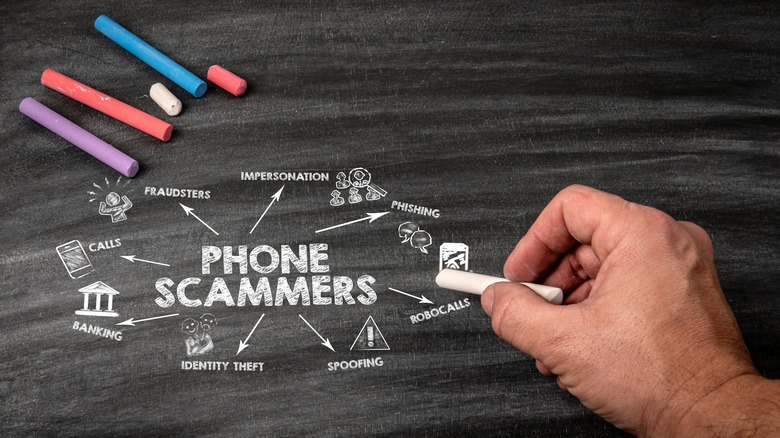There's A Reason Why People Are Believing This Phone Scam In California - It Involves The Police
Back in the days of landlines and caller ID, you never knew who was on the other end of the phone. It could be a family member or friend, or it could be a telemarketer. While unsolicited calls were annoying, they probably weren't trying to get your bank account information. Times have certainly changed. According to the Federal Communications Commission (FCC), Americans today collectively receive about 4 billion spam calls every month. You read that correctly, that's billion with a "b."
Sometimes, it's easy to identify these calls and simply ignore them, especially if they come from an unknown number that isn't local to you or there's a delayed or odd greeting when you answer. There are even ways to block them before they disrupt your day. Being easily identified defeats the purpose of the call, however, and spammers have come up with techniques that make them seem like legitimate callers.
Some phone scammers create a false sense of urgency to make you panic. Others may impersonate the authorities and threaten legal action. The Hermosa Beach Police Department in California recently issued a public statement warning of a new phone scam that is targeting local residents. Not only are the callers impersonating police officers, but the spammers are spoofing the department's official police number as well. The Hermosa Beach PD issued some words of advice to help protect residents from phone scammers.
What is spoofing, and how do you fight it?
Many spam callers use spoofing to deceive victims into thinking a call is legitimate. Spoofing causes your phone's caller ID to display a phone number that makes the call look legitimate. It may simply display a local number when the caller is thousands of miles away, or it can also spoof the number of an official organization, such as your financial institution or even your local police.
This is the situation in Hermosa Beach, where residents have received calls from spammers pretending to be their police department. The PD warned local residents and advised that they would never call to demand money or payment for bail and warrants, nor would they request your personal or financial information via a phone call. They definitely do not want you to send money or gift cards!
This scam is not new or unique, however. The sheriff's office in Alexandria, Virginia issued a warning about the exact same scam earlier in October 2025. Spoof calls are particularly difficult to fight because your phone's call filtering or third-party apps may not recognize them as spam, and callers can be very convincing. As such, the FCC offers several tips to help you protect yourself. The agency suggests never giving out your personal information — including your social security number, account numbers, passwords, or your mother's maiden name — to unknown callers. If the caller claims to be from a company or agency, hang up and call the official number associated with that account or agency. Then, you can verify the caller's request yourself.

